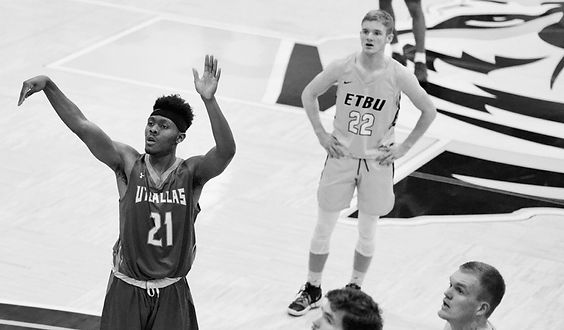
XAVIER FERRELL
BASKETBALL | ACL INJURY

Hey!
Meet Xavier, the next GQ cover model (-;
Haha just kidding.
I'm Xavier, but people mainly call me "X"
I'm a senior basketball player at UTD and I've played since I was was seven.


Watch Xavier's story here:

FULL INTERVIEW
My name is Xavier Ferrell. I'm a senior basketball player at the University of Texas at Dallas.
Yeah, I've been playing basketball since I was seven years old.
Explain details on how your injury happened when it happened, where it happened. etc.
My senior year of high school basketball during the last game of district with only two minutes left in the game, I was on a fast break. I tried to sidestep somebody and as soon as I planted my second step up, I felt my knee buckle and I fell. I was in a lot of pain, so I went to the doctor the next week to get it checked. Turns out I tore my ACL and my medial meniscus.
What was your reaction immediately following the injury?
When I first got hurt, I knew that something was wrong. I had never felt the pain like that before. The trainers tried to convince me that it was just a sprain. So since that was the last game of the season, we had a playoff game afterwards and they just taped me. I played that game with my knee taped up. Looking back on it, it was probably kind of stupid, but I was trying to win the game. I knew something was wrong, but I didn't think it was to the extent that it was. I thought I was going to be out for just a couple of weeks and miss like the first game or two playoffs. Hopefully my team could hold it down. Hopefully I can get back out there. But I never really thought that it was the worst possible injury. I didn't think of magnitude of what had actually happened or anything like that at that time.
What was your reaction after you found out how badly you hurt it?
Man, honestly, I'm not an emotional person at all. But as soon as the doctor had told me, I started crying. I remember my mom had to run back into the room cause she heard me cry. So she came into the door and gave me a hug. I broke down. It was pretty, pretty tough to hear the news.
How did your mental recovery look after the initial shock?
When I first got diagnosis that I tore my ACL, I was really sad. I was really depressed and didn't want to leave honestly. Schools out in May and you're already feeling senioritis, so you don't really feel like doing anything. So I really didn't want to go to school. I really didn't want to leave my room. Honestly. That carried over to when I first got the surgery, for a week or two because I tore my meniscus too. When you have surgery on your meniscus, you're on bed rest. So I couldn't get out of my bed. I had to always get assisted to go to the restroom or to take a shower. So that was really hard. But then once I started being able to do stuff in my own power, like walking around, I started to be a little bit happier and happier. As you see the progress kicking in, little milestones that you go through like being able to do a leg press for the first time or do a straight leg raise for the first time is when you start to be happier and happier. I really started feeling better about myself when I was able to like start running again, things like that. Once I got to my first couple of cuts and getting onto the court, being able to get shots up around the five month mark, that's when I could really say "Yeah, I'm pretty much like getting back into the flow things now".
What did you have to do in order to fully recover?
I did rehab twice a day at school. Then after school, I go to physical therapy with the licensed PT. But then there's still a bunch of exercises that you have to do at home just to help build up the quad muscles and hamstring muscles. I still have to do that all the time. I got back on the court doing little stuff by myself. I was able to learn and practice cutting and getting shots up. I didn't really actually start playing organized basketball until about the six month mark.
Did you have any hesitation when you played full contact?
Mentally is probably the hardest part. The doctor clears you for a reason. So if you're cleared to go then you're pretty much able to do almost everything. But the biggest hurdle is definitely mentally and still being scared. It's always in the back your mind that I'm going to re-injure it. Honestly, it's still in the back of my mind til today a little bit. Even just playing an open gym last week, I kinda got tangled up with somebody and it hurt for like two or three days. I'm still scared to give 100% but it's just something that I've now learned how to deal with.
What was the biggest roadblock you encountered during your recovery?
It was a combination of things. I actually lost weight from my surgery. I lost my appetite so I lost like 15 pounds. Then initially, when I first had my surgery, I wasn't going through a whole lot of pain since you're on nerve blocks and painkillers. You don't really feel it at first. But after a couple hours when they wear off, it is really painful.
Being on bedrest, I had to lie on my back and elevate my leg. I don't sleep on my back; I sleep on my stomach. So I couldn't sleep well. I'd just be up til 3 A.M. just sitting there because I was in so much pain and I couldn't fall asleep because I don't usually sleep on my back. After about 2 weeks after that, the pain went down and I was able to like sleep better.
I definitely missed playing. In high-school you're known by your status. So
I was always known as a "good basketball player", so not being able to play
really killed me. Even when you're just having a rough day or something, you
could always go to the court get shots up, listen to music, block everything out
and your day would just suddenly get better, but not being able to do that really
sucked. And it wasn't something I wasn't able to do it for only two weeks, it was
the whole 6 months, so you really don't understand how long of a time that is,
until it happens.
When you couldn't play basketball, what did you turn to cope with your frustrations?
Honestly, it wasn't a tangible thing. The only thing I really did was just try to be more sociable. It sounds cliche, but being able to talk to people really, really helped me. I feel like I got closer to my mom over that time. Like I mentioned earlier, I'm really not an emotional person, but there'd be times at 3, 4 or 5 in the morning where you could hear me upstairs crying, so my mom came up and we'd just have a nice little powwow.
Once I was able to get out the house and crutch around, I was always trying to hang out with my friends as much as possible to laugh and have a good time just get my mind off things. So I would definitely say the relationships that I had in my life really helped me get through my injury.
Who was your support system?
I did not want to be alone because I felt like being alone could really just engulf yourself with anxiety and depression and all that kind of stuff just getting into your own head when it really wasn't necessary.
It's just an injury, you get through it eventually. So yeah, definitely did a lot of talking to my mom. I was always around my best friends in high school, just be walking to class together, hanging out in the locker room at the school, coming over to my house late at night. Just spending time with other people really, really helped me get through.
Would you say those relationships improved after your injury?
Oh yeah, most definitely. Because actually, two of my friends from the same friend group ended up getting injured as well. One of them had torn his ACL. The other, a football player, had broke his foot and he's really, really good - like he could be drafted into the NFL. So he was really depressed about that. But we definitely still had the same closeness, same support system. So we always were checking up on each other, whether just be like a little text message or through FaceTime or sending each other stuff on Instagram, Snapchat, Twitter, etc. You definitely improve when you have a collective unit that can help somebody get through something.
How mentally prepared were you for your recovery?
I knew it was gonna suck, but I wasn't really prepared for all the things I'd have to
go through. I remember after they told me, that same night I was googling different
basketball players that have torn their ACL but still made it to the pros. So I was
watching Derrick Rose rehab videos and I'm thinking "They're still active in the
NBA. They got through it, if they can do it, I can do it too!" But I definitely wasn't
prepared for the madness that I had to go through. Man, you never really realize
how much you take your athleticism for granted, even everyday things
like walking. I had to relearn how to walk, I had to relearn how to squat, jog, and
move laterally. So I really wasn't prepared for that. But once you start seeing improvement, that's when you start getting your confidence back. That's when you start believing yourself more and you can see the light at the end of the tunnel. This is really what makes you want to work harder to achieve what you're trying to get to.
Now that you've overcome your injury, would you have changed anything in the process if you could go back?
I wouldn't think so. I feel like I used my own my support system to the fullest. I was probably annoying them honestly with a bunch of questions and always trying to talk. But I feel like I did a pretty good job with it. I mean, I probably could have done a little bit more on trying to find a sports psychologist to talk to because I've heard that really, really helps. So don't don't be afraid to ask for help from psychologists because they know what you're going through and they're not going to be afraid to talk to you about that. I think overall, I did a good job of handling the situation to the best.
What is something positive that emerged from your experience?
I definitely think I'm just a stronger individual right now. I'm not necessarily physically stronger, but definitely emotionally stronger. I think it definitely built a bunch of character in me. I feel like if that was to happen to me right now as opposed to back then and I've never been through it before, then it would have definitely crush me. But I think just being able to get through it and persevere even when you felt like you were at your lowest, helped shape me to the man I am today. I'm honestly thankful for it.
Top 3 Recovery Tips
1. Utilize Your Support System.
You don't have to make new relationships, but definitely don't be afraid to talk to anybody. That's probably the biggest thing. Don't be afraid to talk to anyone.
2. Train Hard in Rehab
There's definitely going to be days when you don't want to do it at all. There's going to be days when you're not seeing any progress and there's going to be days when you're just in a whole lot of pain. Sometimes it's the last thing you want to do. But I'm promise you, if you attack it with the same amount of intensity every day, you're going to get through it and you're gonna look back on it and you're gonna be alright.
3. Understand it's a Process
You probably won't 100% recover from it. Sometimes it'll come back and bother you. I'll probably put myself maybe at 85-90% to what I used to be physically. So it might still come in and nip you in the bud a couple of times, but never give up. You can get through it and it'll make you a better person from from all the experiences and everything that you do to overcome it.
